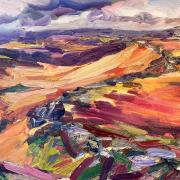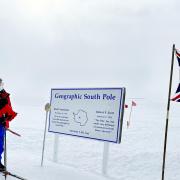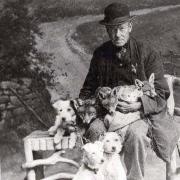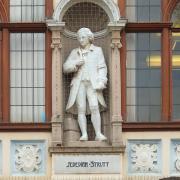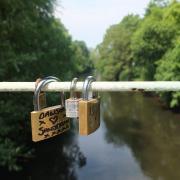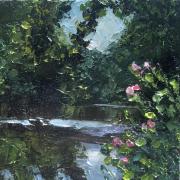Mark Wallington's latest book reveals his travels around the country with just his faithful ukulele as companion. Mike Smith visits Mark at home in Edale...
Mark Wallington is the best-selling author of 500 Mile Walkies and Boogie up the River, two hilarious travel books which describe the trials and tribulations of journeys undertaken with a pet dog which much preferred a room with a nice comfortable sofa to the great outdoors. His new book is an equally side-splitting account of a long-distance trip undertaken with a very different travelling companion – one guaranteed to take him out of his own comfort zone, whilst offering him the chance to pursue a long-held ambition to make it in the music business.
When I visited the author at his home in Edale, he told me all about his musical ambitions, which began with lessons on the classical guitar that were abandoned once he realised that he could never match the prowess of his two sons on their chosen instruments. Describing his more recent musical efforts as lead singer with the Elderly Brothers, Mark said: ‘Five of us put together a band for a friend who wanted some live music at his wedding. Our joke name was entirely appropriate because we were something of a joke band. We all had a love of rhythm and blues, but we didn’t really know how to play it.’
The Elderly Brothers did manage to reach the dizzy heights of playing at the local hang-gliding club’s AGM, but when an item of women’s underwear was thrown on stage during their performance at the vicar’s retirement do (Mark swears this actually took place), they realised that they had little hope of fulfilling their dream of going on the road as a touring band. At this point, Mark decided to try his luck as a solo artist, not with the classical guitar, but with an instrument that would be much easier to play.
Remembering that he had been given a ukulele as a present, Mark reckoned that it would not be too difficult for him to reach a level of competence that would enable him play a few tunes on the instrument at ‘open mic’ evenings held at pubs throughout the country. Hoping to inject a little zing into his act, he also packed a kazoo, together with a bent coat-hanger that would be used to hold the plastic wind instrument in place around his neck. Recalling the day he set off on his 42-day tour of the UK, Mark said: ‘I aimed to start at the Three Graces in Brighton and end at the Smoo Cave Hotel in Cape Wrath. My tour would be the only rock ’n’ roll road trip in history to use public transport.’
Mark’s account of his journey is told in The Uke of Wallington, perhaps best described as a musical version of Bill Bryson’s Notes from a Small Island, which saw the American author making gentle fun of Britain and the British. Mark shares Bill Bryson’s capacity to laugh at himself as well as others and his observations of our national eccentricities are all the better for being written by a native. When I suggested that the account of his hapless adventures as a wandering minstrel may have been exaggerated a little for comic effect, Mark said, ‘I have always thought that humour is the best way of getting at the real truth. In any case, all the incidents described in the book actually happened.’
The book details the highs and lows of Mark’s musical performances, from those occasions when members of the audience clapped or sang along with him to those evenings when they paid more attention to their mobile phones or the soccer match on the television in the bar. His account also contains plenty of candid descriptions of his often dishevelled stage appearance, including the time when his shirt was buttoned in the wrong holes and the evening when he tried to look more interesting by wearing a straw trilby acquired at Poundland.
Mark also has great fun with accounts of his encounters with kamikaze bus drivers who give thrilling rides to passengers enjoying free outings with their bus passes, small-time impresarios at open-mics who lay down strict conditions, such as ‘three songs only, and no filth’, fellow performers who sing their own compositions, some of which sound like ‘social work put to music’, and landladies who impose strict curfews on their guests. He also tells of one landlady who said, ‘It’s a pity you couldn’t stay longer, because it takes a few days to get used to the toilet flush.’
In the early days of his road trip, Mark was delighted to play at an open mic on the Isle of Wight, which brought some sort of closure to his life-long regret at having missed Jimi Hendrix’s famous 1970 gig on the island because his boss had been unwilling to give him time off from his summer job in a pie and chip shop. Back on the mainland, Mark had memorable encounters in Worthing, where he observed: ‘Hell’s Angels don’t die. They just buy a mobility scooter and move to Worthing, where they zip down the pavements, scattering pedestrians as lawlessly as they did in their prime.’
In fact, Mark’s descriptions of various British towns and cities are one of the delights of his book. For example, he depicts Winchester as a place populated by black Labradors and children with Christian names like ‘Harris’, Oxford as a city so far removed from reality that it could be Hogwarts, and Malvern as a town where every shop seems to be selling antiques, even the deli. I also liked his description of Conwy Castle as being ‘so intact that it’s hard to believe that it wasn’t built in the post-war building boom’ and his portrayal of Hathersage as ‘a catwalk for hikers displaying their new equipment’.
Mark’s description of the Scottish capital during the weeks of the Edinburgh Festival is particularly vivid and reflects his own thrill at being there at such a vibrant time. In fact, his appearance in Edinburgh turned out to be the highlight of his trip because he was voted the ‘Uke of Edinburgh’ at a ukulele talent show organised at the Three Sisters pub by the improbably-named Tricity Vogue.
When Mark arrived at the Smoo Cave Hotel for what was intended to be the grand finale of his tour, a football match was being shown on a big television, a group of local lads were playing pool, there was no sound system and his audience comprised a ferryman and a couple of diners, but then... On second thoughts, I’ll not spoil anyone’s enjoyment of the book by revealing what happened next.
My own enjoyment of visiting Mark at his home was enhanced by an impromptu performance on ukulele and kazoo of ‘Roll over Beethoven’, which made me realise just why he had been crowned the Uke of Edinburgh. Of course, Mark’s greatest talent lies in his ability as a writer, which has seen him produce scripts for Not the Nine o’Clock News, pick up the Best Comedy Drama award for The Missing Postman and pen several television films, including, most recently, The Man Who Lost His Head, starring Martin Clunes.
The Uke of Wallington was chosen as the Radio 4 Book of the Week in early May and Mark has been busy giving readings and playing the ukulele at various launch events. But his mind is already on possible future projects, some of which he is testing out on his blog, where he is currently featuring My Life as a Car, a personal history of the golden age of motoring. He is also toying with the idea of celebrating his up-coming 60th birthday with a road trip across the United States, which would give him ample material for a sequel to The Uke of Wallington – perhaps The Uke of Washington.
The Uke of Wallington by Mark Wallington is published by AA Publishing in paperback at �8.99. ISBN: 978-0-7495-7273-0





